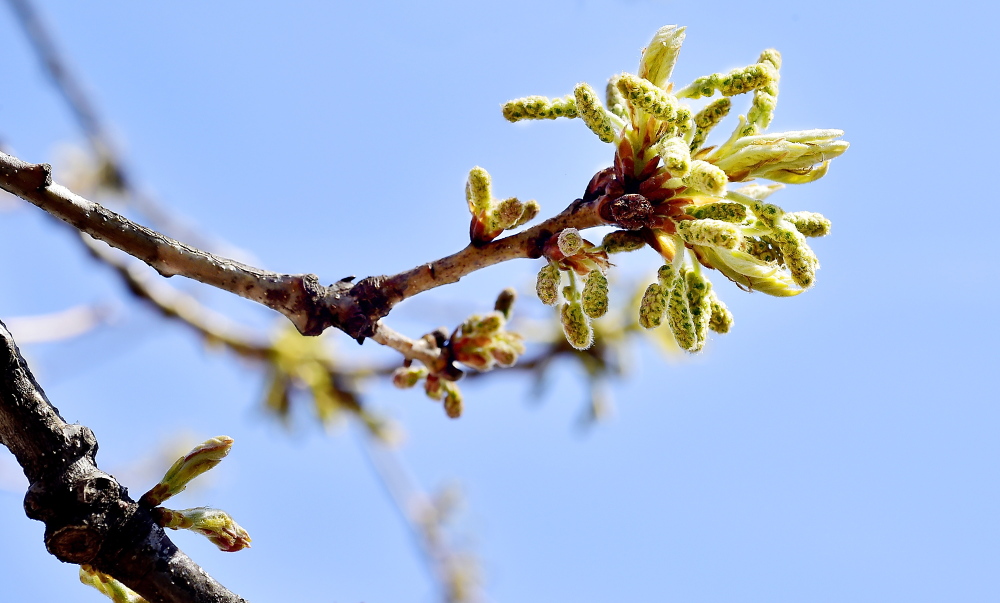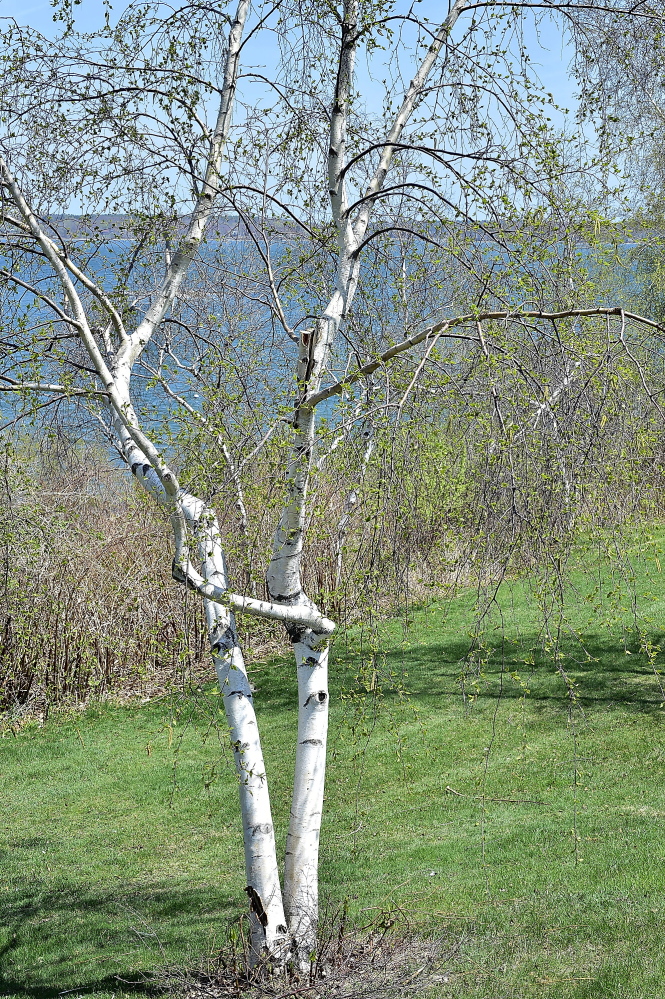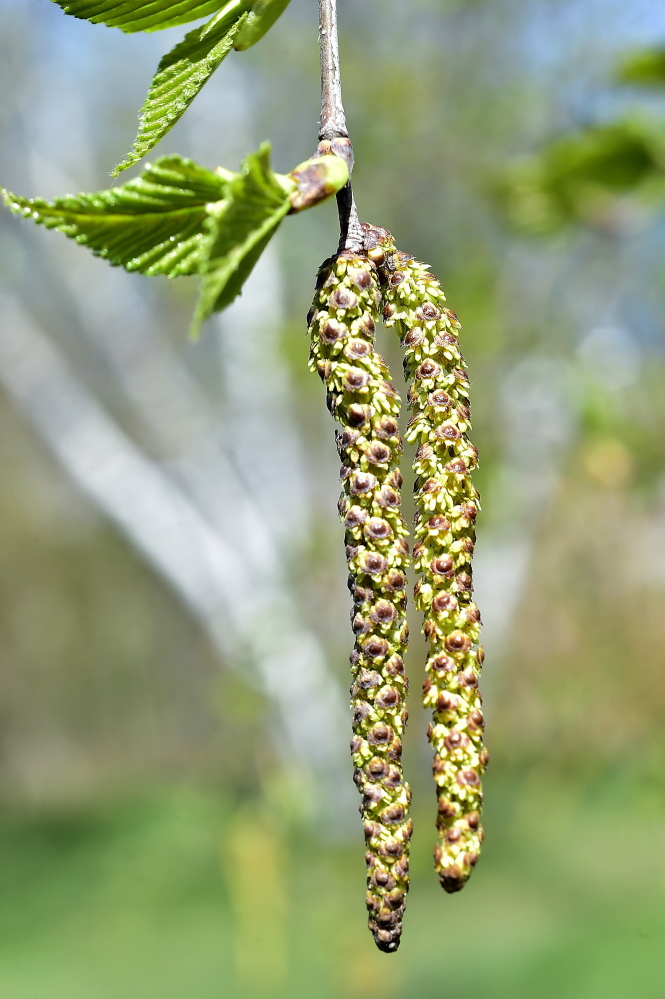Mainers who suffer from allergies and asthma probably are experiencing elevated bouts of sniffling, sneezing, itching and wheezing as a result of unusually high tree pollen counts.
This year’s exceptionally cold, wet winter has led to the above-average pollen levels in Maine that can trigger severe allergic reactions, according to scientists and allergists. Warm, dry, breezy weather over the past week has been spreading pollen — the powder that contains male reproductive cells of seed plants — at an accelerated rate.
Maine’s heightened pollen levels mirror those in other states with high concentrations of tree varieties such as maple, elm, oak and birch, they said. Pollen counts in Portland, based on an index of 0 through 12, have been in the highest category — 9.6 or higher — for 11 of the past 30 days; and the high levels are expected to continue, according to Connecticut-based health information firm IMS Health Inc.
IMS Health maintains a website, Pollen.com, that provides historical data on pollen levels in addition to forecasts for each U.S. ZIP code. It shows recent pollen levels have been in the “high” range for most of the Northeast and parts of the Midwest.
In Portland’s 04101 ZIP code, Friday’s pollen index was 10, according to the website. The count was expected to decrease slightly on Saturday to 9.8, and then jump to 11.7 on Sunday.
Those numbers far exceed the city’s historical average index of 7.8 in May, according to Pollen.com.
Dr. Carah Santos, an allergist and immunologist with Portland-based Allergy and Asthma Associates of Maine, said May typically is a bad month for Mainers who are sensitive to tree pollen.
“This is definitely the biggest time of year, since trees are beginning to bloom,” she said. “We’re beginning to see many more sufferers of typical allergies.”
Brunswick resident Aaron Kitch said his allergy symptoms, which include a runny nose and red, itchy eyes, started acting up three weeks ago. He has since received two shots and has been taking over-the-counter antihistamines to relieve the allergy symptoms.
Kitch said his allergies make it hard to sleep.
“It’s just inconvenient, really,” he said. “It’s bad enough to make me want to do the shots.”
Santos said a combination of environmental factors has contributed to the area’s current extreme tree pollen levels.
Scientists have theorized that especially cold and wet winters cause trees to produce excess pollen in the spring, she said. Warmer, drier air allows the pollen to be released, and it is then spread by wind.
Communities across the country are experiencing elevated pollen levels as the result of a long winter followed by rapid warming, said microbiologist Susan Kosisky, chief of the U.S. Army Centralized Allergen Extract Lab in Washington, D.C.
The extended cold season has pushed back the normal flowering period for early blooming trees such as maple, elm and juniper, she said, which creates an overlap with later-blooming trees such as oak and mulberry, causing overall pollen levels to spike temporarily.
Periods of high precipitation also contribute to the spread of pollen through what is known as the “washout effect,” Kosisky said. Precipitation prevents pollen from spreading, which causes a buildup that finally is unleashed when dry and breezy weather hits.
“The stuff is still there. It’s just waiting,” she said.
The results can be annoying and even dangerous for some sufferers, Santos said.
“With asthma, it can really have some negative effects,” she said, adding that even people without asthma can face debilitating symptoms.
Those with high sensitivity to pollen should take a number of steps to reduce their exposure, Santos said.
• Avoid spending time outdoors between midmorning and midafternoon, the time when pollen is most likely to be in the air.
• After returning from outdoors, shower, wash hair and change clothing.
• Keep car and home windows closed.
• Make sure all air-conditioning systems have filters.
• Avoid the use of ceiling fans, which can kick up pollen within the home.
Regardless of their efforts to avoid pollen, some sufferers will have to resort to medication to alleviate their symptoms, Santos said. Fortunately, a variety of over-the-counter options are available, including the antihistamines and nasal sprays, she said.
Those with more severe reactions may need to consult with a primary care physician or allergist, who can prescribe anti-allergy shots or other prescription medications, Santos said.
It is also possible to be tested for specific allergens, she said. Mainers who are particularly sensitive to tree pollens are likely to be suffering now, while those with stronger allergies to grasses and weeds are likely to feel the greatest adverse effects in the summer.
“If you’re mostly allergic to trees, spring is going to be the worst season for you,” Santos said.
Send questions/comments to the editors.






Success. Please wait for the page to reload. If the page does not reload within 5 seconds, please refresh the page.
Enter your email and password to access comments.
Hi, to comment on stories you must . This profile is in addition to your subscription and website login.
Already have a commenting profile? .
Invalid username/password.
Please check your email to confirm and complete your registration.
Only subscribers are eligible to post comments. Please subscribe or login first for digital access. Here’s why.
Use the form below to reset your password. When you've submitted your account email, we will send an email with a reset code.